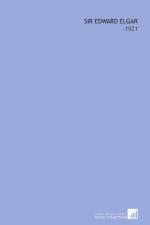|
This section contains 392 words (approx. 2 pages at 300 words per page) |
Encyclopedia of World Biography on Edward Elgar, Sir
The works of the English composer Sir Edward Elgar (1857-1934) ushered in the modern flowering of English music. His work is characterized by brilliant orchestration and impressive craftsmanship.
Edward Elgar was born on June 2, 1857, in Worcester. His father played the organ and directed the choir in St. George's Catholic Church, was a violinist in local orchestras, and ran a music store. This musical ambience was school and conservatory for Edward, who received no formal musical education except for a few violin lessons. He served his apprenticeship as a church organist, choirmaster, and director of amateur orchestras and the band of the county mental institution. The focus of musical activity was the annual choir festival, when distinguished conductors and soloists performed oratorios by George Frederick Handel and Felix Mendelsohn, as well as newly commissioned works, with the local choir.
Elgar's earliest works were for his church choir, and in later years his most important compositions were large oratorios commissioned for choir festivals. Through these performances he became known throughout England. His first important orchestral piece was the Enigma Variations (1899). The "enigma" refers to the theme on which the variations are written, a countertheme to an unnamed and unplayed melody. There have been many conjectures about the mysterious theme, but its identity has never been determined. Each of the variations is labeled with the initials or nickname of friends of the composer, and each variation is a musical character sketch. The piece is beautifully orchestrated and written.
Elgar's choral masterpiece is The Dream of Gerontius (1900). Written to a religious poem by Cardinal Newman, it is perhaps the finest English composition of the Victorian era. It is Wagnerian in its use of leitmotivs characterizing the protagonists and situations, the rich, chromatic harmony, and the masterful orchestral writing.
Other important works by Elgar are the Violin Concerto (1910) and two overtures, Cockaigne (1910) and Falstaff (1913). His best-known piece is Pomp and Circumstance No. 1 (1901), a concert march from which the patriotic hymn "Land of Hope and Glory" was written. Its honest, brilliant tunes epitomize the optimism of Edwardian England.
Elgar was knighted in 1904 and named master of the king's music in 1924. By the time of his death on Feb. 23, 1934, in Worcester, the younger 20th-century composers had made his music seem old-fashioned. Later evaluations, however, have been more generous, and Elgar's place in music seems once again assured.
|
This section contains 392 words (approx. 2 pages at 300 words per page) |


